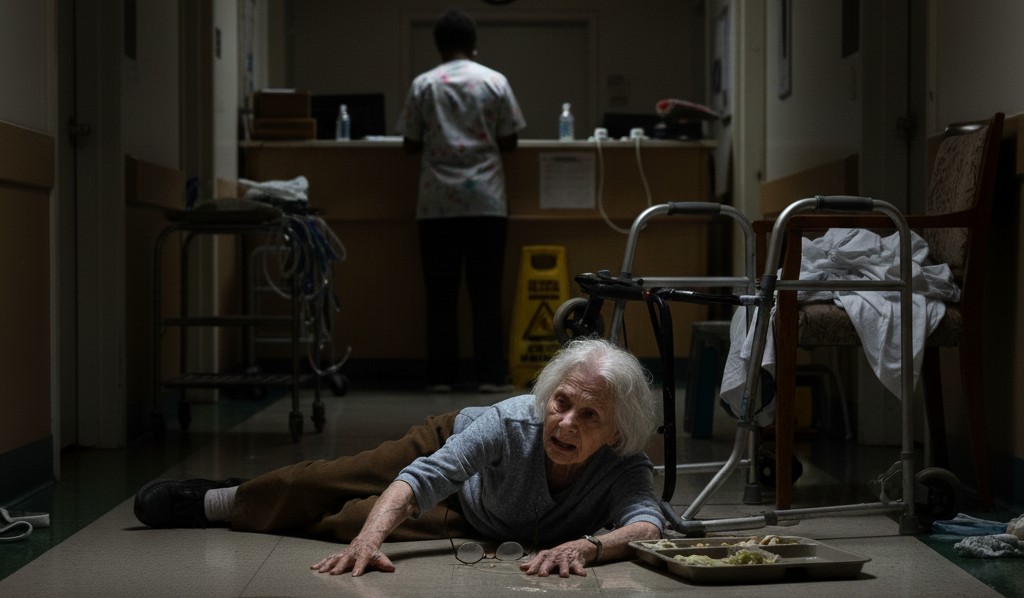Falls in Nursing Homes Are Preventable. Our Attorneys Hold Facilities Accountable

Slip and falls are among the most common and preventable accidents impacting residents in long-term care facilities. The consequences are often catastrophic: broken bones, internal bleeding, traumatic brain injury (TBI), and even death.
Learning that a loved one has been seriously hurt is stressful enough. Realizing the fall may not have been accidental, but a sign of systemic neglect within the facility, can be devastating.
Our team of attorneys at Crowe Arnold & Majors, LLP is dedicated to helping victims and their families navigate these challenging circumstances and seek fair compensation. If you suspect your loved one was hurt due to unsafe conditions or a lack of supervision, schedule a free consultation with a nursing home abuse lawyer to explore your legal options.
No Fee Unless We Win!
Falls in Nursing Homes Are Often a Sign of Neglect
The Centers for Medicare & Medicaid Services (CMS) evaluates nursing homes across the country on factors such as care quality and staffing levels. Using this data, the Austin-based advocacy group Families for Better Care publishes state-by-state report cards on nursing home performance. In its most recent rankings, Texas earned an “F” and placed last among all 50 states.
These poor ratings reflect conditions that put residents at real risk—one of the most common examples is preventable falls. They often point to substandard care caused by faulty equipment, unsafe facility conditions, or negligent staff supervision.
What Proper Supervision and Fall Prevention Should Look Like
Proper supervision and fall prevention in Texas nursing homes require compliance with both federal safety standards and state regulations designed to protect residents, including the following:
- Admission & regular risk assessments. Federal regulation requires that nursing homes assess each resident’s risk for falls at admission and update them periodically. In Texas, nursing facilities must assess this risk within 24 hours of admission, at least quarterly thereafter, and when the resident’s condition changes.
- Individualized care planning & interventions. A proper fall-prevention care plan must go beyond general medical needs and directly address fall risks. This may include assigning staff assistance for transfers, scheduling regular toileting to prevent unassisted bathroom trips, adjusting medications that cause dizziness, providing mobility aids like walkers or wheelchairs, and using bed or chair alarms for high-risk residents.
- Environmental safety & facility maintenance. Facilities must take steps to prevent falls by keeping floors dry and free of clutter, ensuring hallways and resident rooms are well-lit, installing and maintaining handrails or grab bars, and keeping mobility aids and assistive equipment in good working order.
- Supervision, staff training, and safe practices. Adequate staffing levels must be maintained, especially during transfers/ambulation, as well as training on fall prevention best practices, and proper use of assistive devices.
Finally, if a resident falls, staff must document the incident in the medical record, complete a formal incident report, notify their doctor and family, investigate the cause, and keep the report on file for regulatory review.
Jury verdict after trial involving allegations of nursing home abuse and neglect, in which victim suffered sepsis and severe malnutrition and dehydration. (Oklahoma)
Settlement involving nursing home fall.
Settlement involving nursing home bed sore and infection death.





Call Now to Pursue Maximum Compensation.
State and Federal Laws That Protect Nursing Home Residents
Here are the specific federal regulations and Texas state laws that protect residents, which include:
- Federal Nursing Home Reform Act (OBRA 1987) – The law passed by Congress that created nationwide standards for nursing homes receiving Medicare/Medicaid funding.
- CMS Regulations (42 CFR Part 483) – The federal regulations issued by the Centers for Medicare & Medicaid Services (CMS) to enforce OBRA. These are the detailed rules facilities must follow to stay in compliance.
- Texas Health & Safety Code, Chapter 242 – The state law specific to Texas that governs licensing, inspections, and residents’ rights within Texas nursing homes.
Families may file complaints with Texas Health & Human Services (HHSC Complaint Intake) or the Long-Term Care Ombudsman Program (Ombudsman Program), both of which investigate concerns and can impose penalties.
What Are My Legal Options If My Loved One Fell in a Nursing Home?

When a loved one is injured in a nursing home fall, families often wonder what legal options they have. In Texas, the law gives victims and their families the right to pursue compensation for the harm caused.
Who Can Be Held Liable?
The following parties may be held liable in a nursing home fall:
- The nursing home facility – for unsafe conditions, inadequate staffing, or negligent care.
- Individual staff members – if their direct actions or failures to act caused harm.
- Corporate owners and management companies – for policies, budgets, or staffing decisions contributing to unsafe care.
- Third-party providers or contractors – such as pharmacies, medical specialists, or maintenance vendors, if their negligence played a role.
If a nursing home fall results in your loved one’s death, Texas law allows certain family members to file a wrongful death claim. These lawsuits can seek compensation for funeral expenses, the loss of companionship and support, mental anguish, and other damages.
What Damages Can Be Recovered in a Lawsuit?
Although every case is unique, damages in a nursing home fall lawsuit may include current and future medical expenses, rehabilitation and long-term care costs, pain and suffering, mental anguish, and loss of mobility or independence. In cases where the facility’s conduct was especially reckless or harmful, courts may also award punitive damages.
How a Nursing Home Slip and Fall Attorney Can Help
As is the case in most personal injury lawsuits, the defendant is unlikely to acknowledge fault voluntarily. This is particularly true in cases involving nursing home slip and fall accidents. Not only does the nursing home have an incentive to minimize the damages it owes to the victim, but it risks losing future business if word gets out about its negligence.
If our attorneys discover evidence of nursing home abandonment or negligence that caused your family member’s fall, we will handle every step of the legal process with compassion and efficiency. We know how to negotiate with insurance companies and fight for the maximum compensation your loved one deserves. Our firm takes all nursing home fall cases on a contingency basis, so there are no financial risks in getting high-caliber legal representation.
How Our Attorneys Build a Case with Facility Reports, Staff Records, and Expert Testimony
At Crowe Arnold & Majors, we build cases on hard evidence. Facility inspection reports, including violations documented under Texas Health & Safety Code Chapter 242 and federal CMS regulations, help establish a pattern of unsafe practices. Staff records, such as training logs, schedules, and incident reports, reveal whether the facility was understaffed or failed to follow its own care plans.
We also work with medical and nursing experts who can explain how inadequate supervision, improper care, or systemic neglect led directly to a resident’s injuries. These cases can be complex, but an experienced Dallas nursing home abuse lawyer can investigate what happened, identify who is legally responsible, and hold them accountable.

John W. Arnold,
Partner, Trial and Appellate Attorney
With over 25 years of experience, John is a seasoned trial and appellate attorney known for delivering results.

David W. Crowe
Partner, Personal Injury
For more than 30 years, David has been a powerful advocate and fighting for individuals harmed by negligence and abuse.

D.G. Majors
Trial Attorney, Personal Injury and Product Liability
D.G. is a trial lawyer with a strong track record of results in personal injury, product liability, and commercial litigation.
Schedule a Free Consultation with a Dallas Nursing Home Fall Attorney Today
If your loved one was injured in a nursing home fall, you don’t have to face this alone. The consequences can be life-altering, and the cause may not be as innocent as the facility claims.
Contact our office to schedule a free consultation with a Dallas nursing home abuse lawyer at Crowe Arnold & Majors, LLP today. We’re here to listen, guide you through your options, and help you seek the answers your family deserves.
If You’re Coming to Our Dallas Office
- From Uptown: Take Pearl St. southbound. We’re a few blocks from Klyde Warren Park.
- From Deep Ellum or East Dallas: Head west on Elm Street—near the Dallas Museum of Art.
- From Oak Lawn or Turtle Creek: Take Oak Lawn Avenue to Ross or Cedar Springs toward Downtown.
- From I-30 or US-75: Use the Harwood or St. Paul exits. Street and garage parking is available.
For your convenience, we also offer virtual consultations for families throughout North Texas and Oklahoma. Whether you visit us in person or meet with us online, our team supports you every step of the way.
Our Dallas Location
6550 Bank of America Plaza
901 Main St.
P: 214-231-0555
